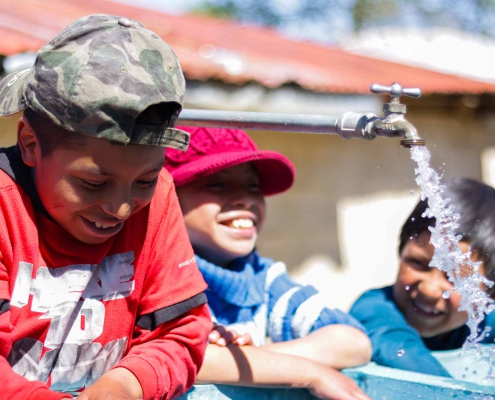The programme to be carried out in El Salvador to promote the Creation of a public policy that guarantees the sustainability of the drinking water and sanitation sub-sector in rural areas – Phase II (SLV-060-B).
Introduction
The economic and social consequences provoked by the global coronavirus pandemic continued throughout 2021, with a significant impact on Latin America and the Caribbean. Despite this, the Cooperation Fund for Water and Sanitation pushed ahead with active programmes -that had been slowed down by the health situation-, and began planning and implementing projects that were approved in 2020 to address the pandemic.
Strategically, the Fund continued working on the lines related to institutional strengthening in partner countries, sectoral planning and the Integrated Water Resources Management approach to promote the sustainability of water and sanitation systems and improve global water governance.
The new programmes launched in 2021 work along these lines, such as the one aimed at Ensuring the human right to water by reducing vulnerability in Pedro García (Dominican Republic): an initiative that will increase the capacities of the Santiago Aqueduct and Sewage Corporation (CORAASAN, according to its initials in Spanish); or the one that will focus on Institutional and Technical Strengthening for water and sanitation providers to improve resilience in communities in the municipality of Sololá, in Guatemala. This programme will commence in early 2022, implemented by the NGO Action Against Hunger Guatemala.
In 2021, progress has also been made on preliminary studies to launch other programmes already approved in 2020, which will focus on institutional strengthening. They are listed below:
Highlight
In 2021, the Cooperation Fund for Water and Sanitation, one of the most ambitious instruments of the Spanish Cooperation in the water and sanitation sector, continued to work towards the fulfilment of human rights to water and sanitation (HRWS), prioritising the most fragile countries and the most vulnerable populations.
More information

From an Integrated Water Resources Management (IWRM) approach, which implies care and conservation of the environment, over the past few years the Fund has worked on the design and implementation of specific indicators to measure the relationship between the programmes and environmental care from an IWRM perspective. Thanks to these new indicators, which are incorporated into the results matrix of the Fund and the programmes, it can be said that, until 2021, 541 specific actions have been undertaken to protect the resource and 376 technical documents, or guides and procedures have been drawn up using the Integrated Water Resources Management approach. In addition, more than 63,000 people have received workshops and awareness-raising on this issue.
The gender-sensitive approach is another of the aspects on which greater emphasis has been placed. In 2021, the indicators have also been revised to better reflect the specific impact of the programmes on women and work has been carried out to develop a series of guidelines and basic working tools to easily incorporate and measure the gender-sensitive approach in the programmes.
.

